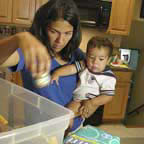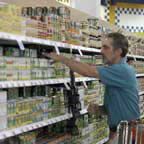1. Get a Kit
 Gather Emergency Supplies
Gather Emergency Supplies
Food Supplies
 If a natural or human-caused disaster strikes your community, you might not have access to food, water, and electricity for a while. By taking steps now to store emergency food and water supplies, along with a disaster supplies kit, you can reduce the affect of any such disaster on your family.
If a natural or human-caused disaster strikes your community, you might not have access to food, water, and electricity for a while. By taking steps now to store emergency food and water supplies, along with a disaster supplies kit, you can reduce the affect of any such disaster on your family.
Detailed information on the steps outlined below can be found in the American Red Cross publication, "Food and Water in an Emergency."
During and after a disaster, it will be vital that you and your household (including your pets) eat enough to maintain your strength.
- Store foods that you eat regularly. Foods that require no refrigeration, preparation, or cooking are best. Include vitamin, mineral,
and protein supplements to ensure adequate nutrition. - Store enough food for two weeks. It is better
to have extra you can share than to run out. - Individuals with special diets and allergies will need particular attention, as will babies, toddlers, ill and elderly people. Nursing mothers may need liquid formula, in case they are unable to nurse. Canned dietetic foods, juices, and soups may be helpful for ill or elderly people.
- Make sure you have a manual can opener and disposable utensils.
During and after a disaster, eat at least one well-balanced meal each day, more if you are working hard. If activity is reduced, healthy people can survive on half their usual food intake for an extended period and without any food for many days. Food, unlike water, may be rationed safely, except for children and pregnant women.
For emergency cooking, you can use a fireplace or a charcoal grill or camp stove outdoors. Use only approved devices—like candle warmers, chafing dishes, and fondue pots—for warming food. If you heat food in its can, be sure to open it and remove the label before heating. Never leave open flames unattended.
How and Where to Store Food
 Keep food in a dry, cool spot—out of the sun, if possible.
Keep food in a dry, cool spot—out of the sun, if possible.- Wrap perishable foods, such as cookies
and crackers, in plastic bags and keep them in sealed containers. - Empty opened packages of sugar, dried fruits and nuts into screw-top jars or airtight cans to keep them fresh and unspoiled.
Avoid
- Canned goods that have become swollen, dented or corroded.
- Fatty, high-protein or salty foods when your water supply is low.
Do
- Keep your hands clean — it's one of the best ways to keep from getting sick. If soap and running water are not available, use alcohol-based hand gels or wipes to clean hands.
- Inspect all food for signs of spoilage before use. Throw out perishable foods, such as meat and poultry, that have been left out at room temperature for more than 2 hours.
- Eat salt-free crackers, whole grain cereals and canned foods with high liquid content if your water supplies are low.
- If there's a power outage, eat food in the refrigerator first, the freezer next, and finally from your stored supplies. In a well-filled, well-insulated freezer, foods will usually still have ice crystals in their centers (meaning foods are safe to eat) for at least two days.
Replace your stored food on a regular basis
Within six months, use
- Boxed potatoes.
- Dried fruit.
- Dry, crisp crackers.
- Powdered milk.
- Canned, condensed meat and vegetable soups.
- Canned fruits, fruit juices and vegetables.
- Hard candy and canned nuts.
- Jelly.
- Peanut butter.
- Ready-to-eat cereals and uncooked instant cereals.
- Vitamins.
In proper containers and conditions, the following can be stored indefinitely
- Baking powder
- Bouillon products
- Dried corn
- Dry pasta
- Instant coffee, tea and cocoa
- Soft drinks
- Vegetable oils
- Salt
- Soybeans
- Wheat (for breadmaking)
- White rice
For more information, contact any of the following:
- Your local American Red Cross chapter
- Your state and local health departments
- Your local emergency management agency
- CDC Public Response Hotline
English 1-888-246-2675
Spanish 1-888-246-2857
TTY 1-866-874-2646)
- Page last updated September 4, 2007
- Content source: CDC Emergency Communication System (ECS), Division of Health Communication and Marketing (DHCM), National Center for Health Marketing (NCHM)
Get email updates
To receive email updates about this page, enter your email address:
Contact Us:
- Centers for Disease Control and Prevention
1600 Clifton Rd
Atlanta, GA 30333 - 800-CDC-INFO
(800-232-4636)
TTY: (888) 232-6348
24 Hours/Every Day - cdcinfo@cdc.gov

